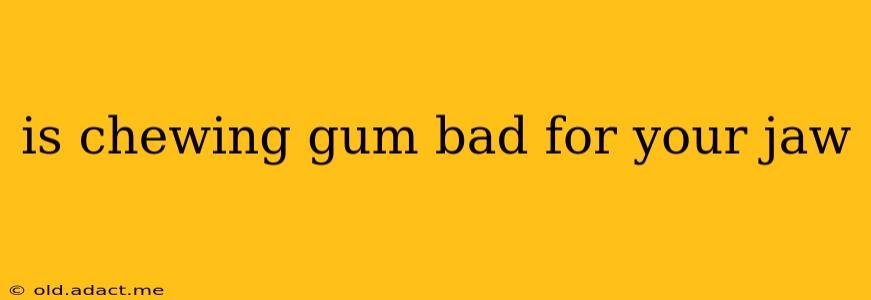Is Chewing Gum Bad for Your Jaw? A Comprehensive Look at the Effects
The question of whether chewing gum is bad for your jaw is a complex one, lacking a simple yes or no answer. While moderate gum chewing can offer some benefits, excessive or improper chewing habits can indeed negatively impact your jaw joint (temporomandibular joint or TMJ) and surrounding muscles. Let's delve into the details.
Can Chewing Gum Cause TMJ Disorders?
Yes, excessive or forceful gum chewing can contribute to temporomandibular joint disorders (TMJ disorders). TMJ disorders encompass a range of conditions affecting the jaw joint and surrounding muscles, causing pain, clicking, popping, and limited jaw movement. The repetitive clenching and grinding associated with vigorous gum chewing can strain the jaw muscles and joint, potentially leading to inflammation and pain.
What are the Potential Negative Effects of Chewing Gum on Your Jaw?
Several negative effects can stem from excessive or improper gum chewing:
-
Jaw Muscle Pain: Overuse of the jaw muscles through prolonged or forceful chewing can result in muscle fatigue, soreness, and even myofascial pain syndrome (a chronic pain condition affecting muscles and fascia).
-
TMJ Pain and Dysfunction: As mentioned above, repetitive stress on the TMJ can lead to pain, inflammation, and dysfunction of the joint itself. This might manifest as clicking, popping, or locking of the jaw.
-
Headaches: Tension in the jaw muscles due to excessive gum chewing can often trigger headaches, particularly tension headaches.
-
Tooth Damage: While less directly related to the jaw itself, forceful chewing can also damage teeth, leading to wear and tear or even chipping.
-
Increased Anxiety: While not directly a jaw problem, the repetitive action of gum chewing can, for some individuals, exacerbate feelings of anxiety or restlessness.
How Much Chewing Gum is Too Much?
There's no magic number, but moderation is key. Occasional chewing is unlikely to cause problems for most people. However, if you find yourself chewing gum for extended periods throughout the day or clenching your jaw while chewing, you should consider reducing your intake. Listen to your body – if your jaw feels tired, sore, or achy, it's a sign to take a break.
What Kind of Gum is Least Likely to Harm My Jaw?
The type of gum likely matters less than the intensity and duration of chewing. However, choosing sugar-free gum can help minimize the risk of dental cavities, which indirectly might impact your jaw health in the long run through potential tooth extractions or other dental interventions. Avoid overly hard or chewy gums that require excessive force to chew.
Does Chewing Gum Strengthen Jaw Muscles?
While some believe chewing gum strengthens jaw muscles, the evidence is inconclusive. Moderate chewing might provide a mild workout for these muscles, but excessive chewing can lead to the problems mentioned above, negating any potential benefits. Targeted exercises designed to strengthen jaw muscles are generally preferred over relying solely on chewing gum.
Can Chewing Gum Worsen Existing Jaw Problems?
Individuals already experiencing TMJ disorders or other jaw problems should exercise extra caution when chewing gum. It’s advisable to consult with a dentist or other healthcare professional before incorporating gum chewing into their routine. They can offer personalized advice based on the individual's specific condition.
In conclusion, while occasional chewing gum poses little risk for most people, excessive or forceful chewing can negatively impact your jaw health. Moderation, awareness of your chewing habits, and listening to your body's signals are crucial to avoiding potential problems. If you experience jaw pain, headaches, or other symptoms, consult a healthcare professional for diagnosis and treatment.
